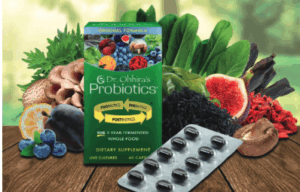Original Post Date: January 19, 2022
Stress and anxiety are increasingly being recognized as significant health risks. Results from a survey titled Stress in AmericaTM 2020 conducted by the American Psychological Association (APA) stated: “We are facing a national mental health crisis that could result in serious health and social consequences for years to come.”¹ Furthermore, the World Health Organization (WHO) has classified stress as the health epidemic of the 21st century.
There are many challenges in today’s world that can cause stress and anxiety, which can cause alterations in the gut microbiome resulting in dysbiosis. Similarly, dysbiosis and the resulting gut inflammation affect the brain, which can cause symptoms of stress and anxiety. The purpose of this article is to discuss how taking proactive steps to improve your gut health may help reduce or alleviate symptoms of stress and anxiety.
The Microbiome-Gut-Brain Axis
The term “microbiome-gut–brain axis” is an extension of the previously used term “gut-brain axis”. The newer terminology emphasizes the critical role that probiotic bacteria in the microbiome play in this bidirectional communication network, which monitors and integrates gut functions and links them to cognitive and emotional centers of the brain. Studies have shown that the gut microbiome influences moods and behavior by sending signals to the brain via vagus nerve. This communication pathway is called the microbiome-gut-brain axis.
Two Nervous Systems
Humans have two nervous systems. The brain is the main component of the central nervous system (CNS), which also includes the spinal cord. However, we also have an enteric nervous system, which located in the gut. This is a vast network of neurons embedded within the walls of the gastrointestinal (GI) tract is sometimes referred to as the “second brain”.
Dysbiosis/Bacterial Imbalance
A healthy gut microbiome contains approximately 85-90% beneficial probiotic bacteria and only 10-15% “potentially” bad bacteria. Everyone has some potentially harmful bacterin in their GI tract but when they only exist in small numbers, they don’t cause problems. However, when bacterial imbalance in the GI tract occurs, many health problems can develop. Studies reveal that most people do not consume a diet consisting of a wide diversity of plant-based foods, which are necessary to support a healthy gut microbiome. Also, the overuse of antibiotics is causing extensive dysbiosis in millions of people. The proportion of beneficial to harmful bacteria in the gut microbiome plays a major role in the kinds of signals sent to your brain. If there’s an imbalance, harmful signals get sent from the gut to the brain, which may cause symptoms of stress and feelings of anxiety. Therefore, correcting gut bacterial imbalance could make it easier to manage anxiety.
Inflammation
Dysbiosis causes intestinal inflammation, which often results in intestinal permeability. Some of these inflammatory substances disrupt the blood-brain barrier and enter the brain, which can contribute to increased feelings of stress and anxiety. Conversely, the postbiotics produced by the probiotic bacteria, in a healthy gut microbiome, send signals to the brain that can support healthy inflammatory response and curb the symptoms of anxiety disorders.
Can Antibiotics Cause Anxiety?
Antibiotics are a known cause of major disruption to the gut microbiome, resulting in dysbiosis². Results of one large study revealed that a single course of antibiotics, which destabilized the gut microbiota, increased risk for anxiety or depression by about 20%, while multiple courses increased risk by almost 50%.³
Anxiety – Can Probiotics Help?
Studies have found correlations between the gut microbiome and neurotransmitters in the blood, which indicate that gut bacteria may be producing neurotransmitters⁴. There’s also mounting evidence suggesting that various species of gut bacteria can help people cope with anxiety and stress. The mechanisms appear to be related to compounds called postbiotic metabolites, which probiotic bacteria produce in the colon when they metabolize components in food. Some of these postbiotic metabolites are neurotransmitters that help to regulate stress and anxiety by sending signals to the brain via the microbiome-gut-brain axis.⁵
Neurotransmitters produced by various species of probiotic bacteria include the following: a) Gamma-aminobutyric acid or GABA is a neurotransmitter that promotes relaxation and reduces anxiety,⁶ b) Serotonin helps regulate functions such as mood, sleep, appetite and anxiety. Prescription drugs classified as select serotonin reuptake inhibitors (SSRIs) boost serotonin levels to treat depression and anxiety. However, these drugs have significant side effects. It is better to promote a healthy gut microbiome so that your probiotic bacteria can make your serotonin (about 90% of serotonin is produced in the gut),⁷ c) Dopamine is the neurotransmitter associated with pleasure and reward. Imbalances in dopamine levels can contribute to anxiety and increased fear responses (about 50% of dopamine is produced in the gut).⁸
What Are Psychobiotics?
Psychobiotics is a relatively new term that was created to describe strains of probiotic bacteria that can positively influence mental health issues such as anxiety, depression and how we handle stress. The mental health benefits from psychobiotics are probably due to postbiotic metabolites they make, such as the neurotransmitters mentioned above rather than solely from the presence of the bacteria themselves.
More research is needed before we’ll fully understand how psychobiotics help regulate anxiety and stress. However, a growing body of evidence suggests that strains of probiotic bacteria classified as psychobiotics may play a valuable role helping people modulate anxiety and stress.
How to Increase Psychobiotics
Although estimates vary, recent estimates suggest that the human gut microbiome contains from 3,000⁹ to 5,000¹.⁰ Some people will ask, “How can I increase the strains of psychobiotics in my gut that produce compounds that help manage stress and anxiety”? That’s a valid question, but there is currently no definitive answer to this question. The field of psychobiotics is so new, we still don’t know which of the thousands of species of bacteria in the gut can produce postbiotic metabolites that have a positive effect on mental health. However, as the Director of Science & Education for Essential Formulas, I would like to offer my opinion on this issue.
Grow Your Own Psychobiotics
Millions of people take probiotics. However, there some controversy about whether orally ingested probiotics are effective. Studies have shown that when probiotic bacteria are exposed to stomach acids and bile acids, the bacteria do not survive.¹¹ On the other hand, studies have shown that directly ingesting a wide range of postbiotic metabolites can be an effective way to improve conditions in the gut microbiome ecosystem. This enables an individual’s innate strains of probiotic bacteria to thrive and proliferate. Dr. Ohhira’s Probiotics contains over 500 postbiotic metabolites. Multiple studies conducted with Dr. Ohhira’s Probiotics, in animals and humans, have shown that directly ingesting over 500 postbiotic metabolites provides a wide range of health benefits.
Anxious? Try Dr. Ohhira’s Probiotics
To get started improving your gut health—and potentially helping yourself better cope with anxiety and stress—our award-winning formulas are among the best on the market. Check out Dr. Ohhira’s probiotic supplements or contact us to learn more. In addition to taking Dr. Ohhira’s Probiotics, we like to emphasize the importance of consuming a diet that contains a wide range of fruits and vegetables, which provide the prebiotics that your probiotics need to thrive.
References:
1 Stress in AmericaTM 2020. https://www.apa.org/news/press/releases/stress/2020/report-october
2 Kesavelu D and Jog P. Current understanding of antibiotic-associated dysbiosis and approaches for its management. Ther Adv Infec Dis. 2023 Feb. 24;10:20499361231154443.
3 Lurie I, et al. Antibiotic exposure and the risk for depression, anxiety, or psychosis: a nested case-control study. J Clin Psychiatry. 2015, 76:15221528.
4 Barandouzi ZA, et al. Associations of neurotransmitters and gut microbiome with emotional distress in mixed type of irritable bowel syndrome. Sci Rep 12, 1648 (2022).
5 Bear T, et al. The Microbiome-Gut-Brain Axis and Resilience to Developing Anxiety or Depression under Stress. Microorganisms 2021, 9(4), 723.
6 Bravo, J. A. et al. Ingestion of Lactobacillus strain regulates emotional behavior and central GABA receptor expression in a mouse via the vagus nerve. Proc. Natl Acad. Sci. USA 108, 16050–16055 (2011).
7 Yano, J. M. et al. Indigenous bacteria from the gut microbiota regulate host serotonin biosynthesis. Cell 161, 264–276 (2015)
8 Eisenhofer G., Aneman A., Friberg P., Hooper D., Fandriks L., Lonroth H., Hunyady B., Mezey E. Substantial production of dopamine in the human gastrointestinal tract. J. Clin. Endocrinol. Metab. 1997;82:3864–3871.
9 Rosenberg E. Diversity of bacteria within the human gut and its contribution to the functional unity of holobionts. pj Biofilms Microbiomes 10, 134 (2024)
10 Ferranti E, et al. 20 things you didn’t know about the human gut microbiome. J Cardiovasc Nurs. 2014 Nov-Dec;29(6):479-81.
11 Caillard R and Lapointe N. In vitro gastric survival of commercially available probiotic strains and oral dosage forms. Int J Pharmaceeutics. 2017 March 15;519:1-2:125-127.





